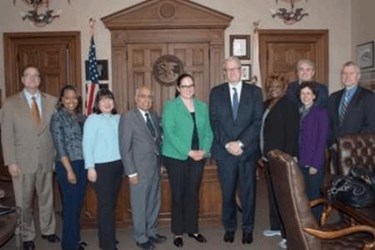Legislative Visit Offers MWRD Opportunity To Promote Initiatives Statewide

Improving the quality of area waterways was a central theme of discussion as leaders of the Metropolitan Water Reclamation District of Greater Chicago (MWRD) made their annual trek to the Illinois State Capitol to deliver their input directly to the members of the Illinois General Assembly.
The MWRD Board of Commissioners and Executive Director David St. Pierre met with Illinois House and Senate leaders to discuss MWRD initiatives and legislation developed to promote a nutrient trading strategy that will help reduce nutrient loss to Illinois waters and eventually the Gulf of Mexico, where a hypoxic zone threatens aquatic life. To meet a goal of reducing the total phosphorus and nitrate-nitrogen from reaching Illinois waters by 45 percent, the MWRD is participating with the Illinois Nutrient Loss Reduction Strategy to develop statewide solutions to address that target.
"We thank our state lawmakers for welcoming us and partnering with us in our pledge to protect our water environment," said MWRD President Mariyana Spyropoulos. "This proposed legislation has allowed us the opportunity to think outside the box in our approach to pollution in our waterways. Through the support of the Illinois General Assembly, we can expand our reach and explore a natural and cost-effective solution to address nutrient loss."
Proposed legislation would allow the MWRD to participate in any available nutrient trading program in the state for meeting water quality standards. According to the U.S. Environmental Protection Agency, nutrient trading is a market-based approach providing economic incentives for voluntary pollutant reductions from point and nonpoint sources of pollution to improve and preserve water quality. Exchanging credits between various sources can provide greater efficiency in achieving water quality goals in the Illinois River. Trading can allow one source to meet its regulatory obligations by using pollutant reductions created by another source with lower pollution controls.
Point sources, like wastewater treatment plants operated by the MWRD, currently account for 16 percent of total nitrogen and 48 percent of the state's phosphorus sources, whereas nonpoint sources like agricultural runoff account for 83 percent of total nitrogen and 49 percent of agriculture and urban runoff accounts for one percent of total nitrogen and three percent of total phosphorus. Nutrient trading will allow the MWRD to focus on a statewide scale in solving the systemic problems instead of being limited to local problems. The MWRD has already been examining many options in reducing nutrient loss downstate at its research agricultural site in Fulton County and working with the farming community to address the issue.
The MWRD is considered a national leader in nutrient recovery, having unveiled the world's largest nutrient recovery facility at its Stickney Water Reclamation Plant in 2016. The MWRD's nutrient recovery facility will greatly reduce its nutrient effluent load to the Chicago Area Waterway System (CAWS) thereby improving water quality in the CAWS. The facility recovers phosphorus and nitrogen to create a high value alternative to fertilizer. The MWRD has the ability to recover up to 10,000 tons of phosphorus per year. By removing phosphorus from the water and returning it to farmers and other agricultural producers, this facility represents a significant shift in the wastewater industry from treatment to recovery for reuse.
In other proposed legislation, the MWRD discussed updating survivor pension benefits in light of recently enacted laws. As a result of the Illinois Religious Freedom Protection and Civil Union Act, all pension benefits previously made available by the MWRD's Retirement Fund to a married retiree and his or her spouse are now benefits that are available to retirees who previously could not legally marry or enter into civil unions.
"Amending this legislation will ensure all couples are equal in receiving proper retirement benefits," said MWRD Commissioner Marty Durkan. "Commissioner Debra Shore deserves credit for calling our attention to this issue, and we thank the members of the Illinois General Assembly for considering this legislation."
The MWRD Board of Commissioners and Executive Director David St. Pierre meeting with House Speaker Michael J. Madigan. Pictured from L-R (Front row): Chairman of Finance Frank Avila and Commissioners Josina Morita and Debra Shore, President Mariyana Spyropoulos, House Speaker Michael J. Madigan, Vice President Barbara McGowan and Commissioner Kari Steele. Back row: Exec. Director David St. Pierre and Commissioners David J. Walsh and Martin J. Durkan.
About The Metropolitan Water Reclamation District Of Greater Chicago
Established in 1889, the MWRD is an award-winning, special purpose government agency responsible for wastewater treatment and stormwater management in Cook County, Illinois. For more information, visit www.mwrd.org.
Source: MWRD
